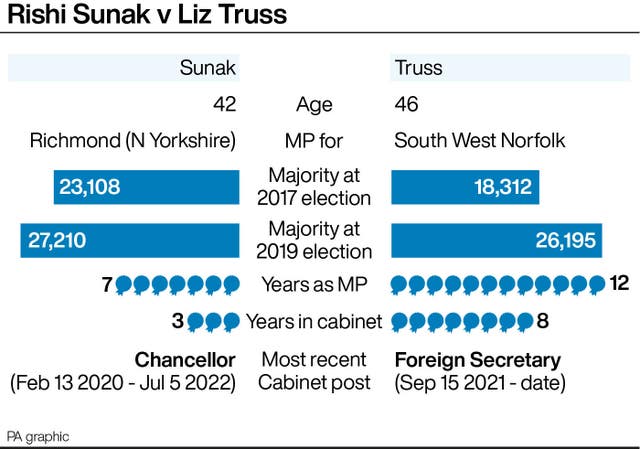
Iain Dale 7pm - 10pm
22 July 2022, 14:54

Tax is one of the big dividing lines between Tory leadership candidates Rishi Sunak and Liz Truss.
There is little justification for cutting taxes in the UK, a top economist has said as the two remaining Tory leadership candidates face off over the tax issue.
Philip Shaw, chief economist at banking group Investec, said that it will be tempting to give people more money in their pockets as the cost of living soars.
But “there is little economic justification to cut taxes right now, despite the cost-of-living crisis resulting in an obvious temptation,” he said.
It comes as Rishi Sunak – the former chancellor – faces off against Foreign Secretary Liz Truss over the leadership of the Conservative Party, and the keys to 10 Downing Street.

A big dividing line is tax.
In short, Mr Sunak announced hikes to corporation tax and national insurance before stepping down as chancellor – Ms Truss has vowed to cut these back.
Her plans would be expensive for the Government – the Institute for Fiscal Studies (IFS) estimates a bill of over £30 billion.
She hopes these cuts can help stimulate growth, so the cost would be lower. The IFS agreed, but only to a limited extent.
Samuel Tombs, chief UK economist at Pantheon Macroeconomics, said that Ms Truss would likely have to borrow more money to fund her cuts.
“We doubt that these tax cuts could be even half-funded by spending reductions elsewhere, suggesting that the chances of the Government eventually running a current budget surplus in the mid-2020s, as currently planned, would be remote under a Truss premiership,” he said.
Mr Shaw said that tax cuts would help if the economy was struggling, but “obviously, that is not where we are right now”.
“The use of tax policy to stimulate the economy would be justified if we were about to enter a sharp downturn, perhaps supplementing interest rate cuts,” he said.

Mr Sunak has promised he will eventually cut tax. But the former chancellor is keenly aware of how much he spent during the pandemic to keep the economy afloat.
He now wants to tap households and businesses – many of which would have struggled even more without Government help – to pay for some of these efforts.
Mr Sunak argues that the amount of tax the Government collects needs to rise before it falls. Only “once we’ve gripped inflation” will taxes come down, he has said.
But Ms Truss has promised jam now for Conservative Party members who want to see a cut in their tax bills.
National insurance would be one of her first priorities in Number 10, followed by a cancellation in the corporation tax increase – scheduled for next year – and cuts to green levies on energy bills.
Mr Sunak’s plans would see the UK return to a corporation tax level it last saw in 2011. UK corporation tax would still remain lower than in the United States.
Ms Truss would keep the levels that came into force in 2017, under then prime minister Theresa May – one of the lowest rates in the developed world.
It will cost around £17 billion a year if the rise is cancelled, but Ms Truss argues that it would encourage investment, so the cost would be lower.
The IFS agreed to an extent, saying the long-run cost of Ms Truss’s plan would be “considerably lower” than the £17 billion. But, it warned, “the effect would certainly not be big enough for the tax cut to pay for itself.”
The IFS also said that her green levy plan still needs fleshing out.
Slashing the levy could save households around £150 a year, according to Ofgem forecasts.
But while Ms Truss has made the promise, there has been little detail of how the cuts would be made.
The IFS said that the candidate has not said exactly which energy bill levies would be suspended – and what would happen to the subsidies for renewable energy that the levies fund.
“These details would be crucial for assessing the likely effects of the policy; and without them, it is impossible to say how much it would cost,” the IFS said.
Campaigners have also warned against the move – saying it could lead to problems down the line in meeting climate targets.
The green levy should be changed, they say, but not by being removed. Instead it should move from being levied on electricity – which has lower carbon emissions – to the gas part of household bills.
This would make it even more economical for households to switch away from polluting gas boilers and stoves to greener electric alternatives.
But with energy bills forecast to hit around £3,300 in October from today’s £1,971 for the average household, people are likely to need more help.
Mr Shaw, however, argued that this should be targeted, while the green levy removal would benefit everyone.
“More help will be needed for households but the correct way to approach this would be to concentrate efforts towards assisting lower-income households,” he said.
Mr Tombs, from Pantheon Macroeconomics, said that a Rishi Sunak win would probably only bring “limited” extra help for households this winter.